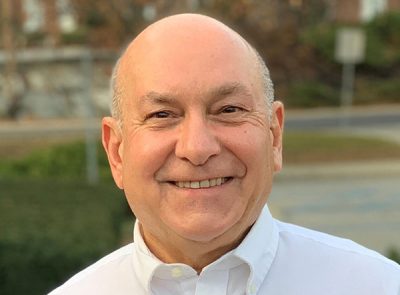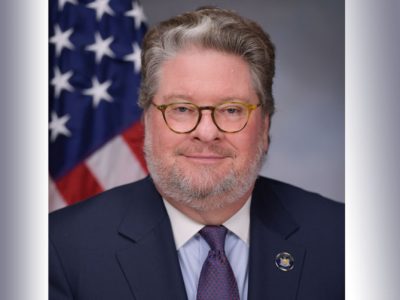Lawler Faces Scrutiny as Medicaid Cuts Threaten Local Hospitals
News Based on facts, either observed and verified directly by the reporter, or reported and verified from knowledgeable sources.

By Idan Yedid, Examiner Reporter Intern
Area lawmakers are warning that Medicaid cuts stemming from the enactment of President Donald Trump’s so-called “Big Beautiful Bill” could put hospitals in the Hudson Valley under severe pressure, potentially forcing service reductions and driving more residents to emergency rooms.
The legislation has also drawn scrutiny of local Republican Rep. Mike Lawler’s vote, with Democratic-aligned groups highlighting his earlier statements opposing Medicaid cuts.
Although exact figures are hard to project, Northern Westchester Hospital could lose $5.8 million in Medicaid revenue and Phelps Hospital $6.5 million, part of more than $100 million in cuts projected across Hudson Valley hospitals, according to estimates from the center-left think tank Third Way.
While Third Way has projected specific losses, local sources stress that the exact impact remains deeply uncertain, as officials say they are still awaiting additional guidance from Albany leaders, especially Gov. Kathy Hochul.
New York officials are already mobilizing around state-level interventions to mitigate the anticipated impact. Hochul recently announced that the state will revert 1.3 million low-income New Yorkers who don’t qualify for Medicaid to an older program, the Basic Health Plan, by July 1, 2026.
Although the move is aimed to manage the fallout from the federal cuts, it may leave hundreds of thousands more without coverage.
State Lawmakers Raise Alarms

Local New York State Assemblyman Chris Burdick, when contacted by The Examiner, discussed the potential financial ramifications of the cuts.
He noted that it is “exceedingly difficult to calculate” the exact impact, but that the effect on reimbursement rates to hospitals is “pretty significant.”
“So we don’t know exactly what it would be, but it certainly will be in the tens of millions of dollars and perhaps hundreds of millions of dollars,” the Democratic assemblyman said in a phone interview. “That would be the direct impact. The indirect impact will be felt as individuals in the state lose their insurance. And as such, those who lose their insurance will more frequently use emergency rooms, which will place a significant burden on hospitals throughout the state, particularly the so-called safety net hospitals, and could place those hospitals in a very stressed financial position.”
Sen. Pete Harckham, in a provided statement to The Examiner, also emphasized the stakes.
“There is no way to sugarcoat this,” the Democratic senator replied through a spokesperson. “The Republican budget bill’s massive cuts to healthcare will have a devastating impact here in New York.”

Harckham, in his statement to The Examiner, also highlighted the scope of the bill’s impact on everyday people.
“Over 1.5 million New Yorkers will lose their healthcare, including 475,000 by the end of 2025,” he said. “The loss of $10 billion annually, which we will never be able to backfill, will decimate the New York healthcare system.”
He also singled out members of New York’s congressional delegation (which includes Lawler) saying they “will deserve the blame for the terrible consequences many New Yorkers will now face.”
Experts say uncompensated healthcare costs for New York hospitals and other providers are expected to increase by $1.8 billion over the next decade, directly resulting from the bill’s changes to Medicaid eligibility and insurance accessibility.
Morning Joe
Lawler, whose vote for the bill followed multiple promises to oppose Medicaid cuts, did not provide requests for comment for this article. But last month, the District 17 Republican did appear on MSNBC’s Morning Joe.
“What they’re parroting is the same talking points put out by the state and by the hospital associations,” Lawler said during the interview, prompting a fiery response from co-host Joe Scarborough.
“You know doctors’ business, you know hospital administrator’s business, better than they know their own business? Is that what you’re telling us here?” Scarborough asked.
Lawler’s remarks on the program also drew strong criticism from national Democrats.
“Local healthcare providers are panicking because their patients’ lives are on the line, and Mike Lawler’s first reaction is to call them liars,” Democratic Congressional Campaign Committee spokesperson Riya Vashi told The Examiner.
The bill will cut $1 trillion in federal Medicaid spending over the next decade.
Financial Strain
A spokesperson for Northwell Health declined The Examiner’s request for comment and directed questions about the projected cuts and their impact to the Greater New York Hospital Association (GNYHA). When reached, the GNYHA also declined an interview request.
However, this past spring, on Examiner Media’s weekly podcast Local Matters Westchester, Derek Anderson, president of Northwell Health’s Northern Westchester Hospital, discussed the gravity of the pending bill.
“We’re in probably one of the biggest fights in our lives that we’ve seen in healthcare in a very long time,” he said. “Those who have been in healthcare 30, 40 years have never seen anything quite like this.”
The cuts are likely to exacerbate the financial strain hospitals already navigate. A local legislative office said that 70 hospitals in New York currently earn a quarter of total patient revenue through government funding, including Medicaid. With just a 10 percent cut to Medicaid revenue, 94 out of New York’s 156 hospitals are expected to see their annual profits erode entirely.
“If you look at Northwell Health in totality, we operate on a 1 percent margin,” Anderson explained in May on the podcast. “This particular proposed legislation really could have devastating effects.”
Anderson also said important programs could face major challenges.
“A good example is the child and adolescent program that’s opening in a couple weeks right here in Mount Kisco,” he said at the time, referring to a new local center for youth mental health. “We can’t do that unless we are able to make those types of investments, and so this federal regulation just puts tremendous pressure on health systems.”

Chatzky Chimes In
Briarcliff Deputy Mayor Peter Chatzky, one of the eight Democratic congressional candidates seeking the nomination to challenge Lawler in next year’s general election, also criticized the congressman on the issue in an upcoming broadcast of the Local Matters Westchester podcast.
Chatzky said Lawler has downplayed the impact on hospitals and shifted responsibility to the state, calling the approach “just spin.”
He specifically highlighted Westchester Medical Center, noting that it is the only level-one trauma center between New York City and Albany, features a burn center, a neonatal intensive care unit, an organ transplant program, a stroke center, and separate children’s hospital.
“How they are going to just survive without any cuts or degradation of service given these tremendous cuts [is] just inexplicable,” he said.
Chatzky added that Lawler cannot credibly blame New York State for the shortfalls while simultaneously voting for federal cuts.
“So I don’t understand how you could be in the federal government and say, ‘Oh, it’s a state problem,’” he said.
Westchester Medical Center could not be reached for comment.
Economic Impact
In terms of employment, Medicaid reductions are expected to eliminate more than 78,000 healthcare jobs, leading to an additional 136,000 jobs lost through an economic ripple effect, according to a local legislative office. This loss accounts for over 2 percent of New York State’s workforce. The office said $14.4 billion will be lost in hospital-generated economic activity as a result, weakening the state’s economy.
In February, before Congress passed the Big Beautiful Bill, Lawler appeared on CNN.
“There are many of us, myself included, who will not cut Medicaid benefits to our constituents, period,” Lawler said. “I will not cut Medicaid benefits.”
The bill was introduced in the House on May 20 and passed two days later by a narrow 215–214 vote, with Lawler voting in favor. After Senate approval on July 1, Trump signed it into law on July 4.
“Mike Lawler’s hypocrisy knows no bounds – after reassuring his constituents that he would protect their health care, Lawler turned around and voted to gut Medicaid, obliterate hospital funding, and kill health care jobs,” Vashi said.
Lawler defends the bill, claiming it will strengthen Medicaid and protect local hospitals by preventing ineligible individuals from accessing benefits, including undocumented immigrants.
“The objective is to protect these vital programs for eligible recipients,” Lawler stated in an interview with NPR.
But Vashi said the bill was “designed to give huge tax breaks to billionaires by slashing health care and food assistance.”
“Anyone saying otherwise is trying to distract from the real harm this bill will cause,” she said.
– Examiner Publisher Adam Stone contributed reporting for this piece.

Examiner Media – Keeping you informed with professionally-reported local news, features, and sports coverage.
